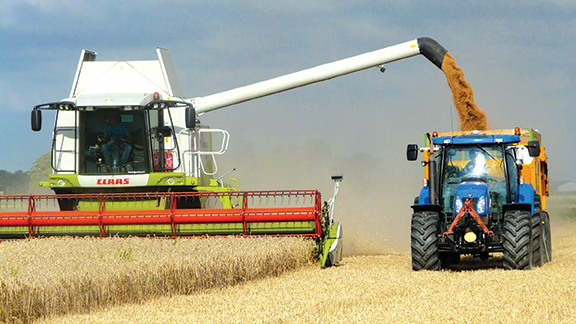On the Farm

The first known people on Earth were hunter gatherers. They would move from one place to another following their food. They were nomadic. Can you even imagine not having a real home? Some time around 8-10,000 years ago, signs of farming food showed up and life dramatically changed. Tools were invented and animals were domesticated. People were able to stay in one place and grow their own food. Today, farming is a 200 billion dollar industry that feeds us all. Farms come in all shapes and sizes. There is backyard farming, family farms and huge industrial farms. What we eat does not just magically appear in the grocery store or at restaurants. Have you ever thought about where what you eat comes from?
Over the last 200 years, food production has changed a lot. There was a time when families would grow most of their own food. They had chickens for eggs, a cow to milk, and they would plant food crops to feed their families. If they couldn’t grow something they needed, they would trade what they had to get the food they wanted. Now huge farms exist that grow just wheat, rice and other grains. Companies like Dole just grow the ingredients for salads. Places exist that have miles and miles of fruit trees called orchards. Others have enormous milking sheds, and chicken (poultry) houses, as well as farms and ranches raising meat cows and steers (bovine).
Having a family farm isn’t easy. A farm must make money to keep operating. Farmers also have to be good businessmen and women. That means learning about the economy, banking and what people want that you can sell. Even for kids there is a massive amount of work to do. Animals have to be fed and watered, buildings that protect the animals and equipment also have to be cared for. Kids who live on farms begin their work before school starts and have more chores after school. Farmers have to learn veterinary work, welding, how to be a mechanic and when and where to plant seeds.
A lot of kids who live on farms join clubs like 4-H and FFA that will help teach them these skills. Even if you live in the city, you can join one of these groups. “Why should I?” you ask. Because farming requires people with many different skills, you make new friends, and learn responsibility. FFA stands for Future Farmers of America but offers activities that cover agriculture technology, plant science, mechanical engineering and natural resources.
When you think of farming you think of plows and tractors. However, things are changing daily. Farmers have gone from the simple equipment pulled by animals to high tech modern machinery and methods. There are robots that milk cows, radio tags on open range bovine to track where they are, and tractors equipped with GPS mapping systems that help with plowing, planting and harvesting. There are even smartphone apps that help turn water on and off in irrigation systems. Scientists help with many jobs on the farm these days and there are many college degrees that are just about agriculture. Scientists help with what to feed your animals and do soil tests to see what crop will grow the best in your dirt, and how to deal with weeds that attack your crops. They also do soil tests that help your crops grow. Do you like bugs? They are really cool. Entomologists study just bugs. They help farmers control the bugs that eat crops.



